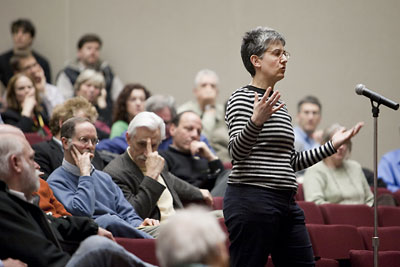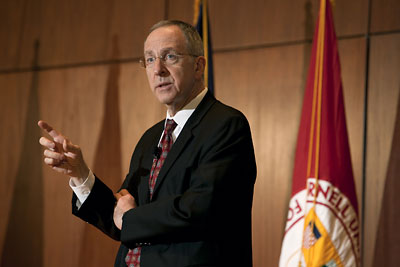Jobs will be lost but also won, faculty told at meeting
By Susan Kelley


As Cornell cuts 5 percent of its fiscal 2010 budget, one thing is certain: The number of faculty, including nontenure-track teaching staff, will be reduced this coming year, according to Provost Kent Fuchs, speaking at a special faculty meeting March 9.
However, Cornell is still hiring some new faculty, said President David J. Skorton, discussing the university's financial situation in the hour-long session in Kennedy Hall's Call Auditorium.
"Everybody is going to have some pain to get through this," Skorton said. "I want to be plain about that ... it's a very difficult situation."
About 450 faculty and others attended the meeting in the 600-seat auditorium. Despite the sobering financial picture that Skorton laid out, the faculty applauded him twice and several thanked him for his transparency regarding Cornell's budget.
Many of the professors voiced concern about budget cuts the university is undertaking and asked about the degree to which the administration would include faculty in strategic planning for fiscal 2011.
"I'd like to know that I am being represented at that table," said linguistics professor Abigail Cohn '78, pointing out that there are no faculty trustees on the Cornell Board of Trustees' Executive Committee. Although Skorton invites Dean of the University Faculty Bill Fry, Ph.D. '70, to attend a majority of senior staff meetings and Skorton regularly attends meetings with the University Faculty Committee, he acknowledged Cohn's concern: "It's a matter of finding a way to satisfy a very reasonable request for more transparency without rupturing a process that has to go forward," he said.
Eric Cheyfitz, director of the American Indian Program, asked if the strategic planning would damage student and academic diversity. "I worry sometimes that we can get overlooked," he said.
Skorton emphasized that the administration considers diversity a priority in the planning process: "Please be assured that this is very much in our thinking," he said.
John Fitzpatrick, director of the Laboratory of Ornithology, took issue with the university's decision to take 5.2 percent of fund balances that are both unrestricted and uncommitted from various units to pay down lines of credit, saying that much of the money had been designated for each unit's use. Skorton said that the situation requires the reduction.
"It's not fair to exclude anyone from dealing with the systemwide problem," Skorton said. "If the money's not being used for something right now, we need to use a small portion of it. ... Forgive my bluntness."
When asked whether the administration was taking into consideration grant monies that might come from the recently signed federal stimulus package, Skorton said no, since federal funding might be cut in the future.
The university is facing a $215 million deficit, or 10 percent of its total Ithaca operating budget. Skorton said that the shortfall consists of $80 million due to the endowment's negative earnings, $35 million taken from the endowment to cover increases in financial aid and a $100 million structural deficit.
Presidential Forum March 16
President David Skorton will update the campus community on the economic situation at an open forum Monday, March 16, from noon to 1 p.m. in Alice Statler Auditorium. The meeting is open to alumni, students, faculty and staff as well as the general public. A question-and-answer session will follow Skorton's remarks.
The university has recovered $50 million of the shortfall with across-the-board budget cuts for fiscal year 2010, as well as an additional $35 million through a reduction in endowment spending. Cornell's lines of credit will be partially paid back this year by allocating 30 percent of the available central reserves, which is $50 million, and 5.2 percent of the unit reserves, which is $25 million. An additional 5 percent budget reduction, representing $50 million, will come from the strategic plan for fiscal year 2011.
As to whether departments and programs would be eliminated or combined, Skorton said only if it makes sense from the academic perspective. Faculty members and their units -- not the administration -- would have to make those decisions as part of their strategic planning.
"This cannot be a top-down process," Skorton said. "The only thing I am insisting on is that we have to do it quickly, in this calendar year. In planning for the fiscal year 2011, we cannot just keep taking money away from people. We have to do things in a more strategic way."
Media Contact
Get Cornell news delivered right to your inbox.
Subscribe